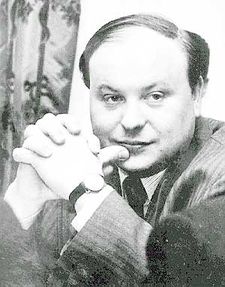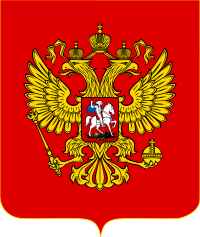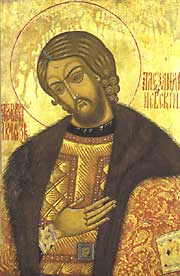Yegor Gaidar
| Yegor Gaidar Его́р Гайда́р |
|
 Gaidar in early 1990s |
|
|
|
|
|---|---|
| In office 15 June 1992 – 15 December 1992 |
|
| President | Boris Yeltsin |
| Preceded by | Boris Yeltsin |
| Succeeded by | Viktor Chernomyrdin |
|
first Minister of Economy and Finance of the RSFSR
|
|
| In office 11 November 1991 – 19 February 1992 |
|
| President | Boris Yeltsin |
| Preceded by | Position established |
| Succeeded by | Position abolished |
|
first Minister of Finance of Russia
|
|
| In office 19 February 1992 – 2 April 1992 |
|
| President | Boris Yeltsin |
| Preceded by | Position established |
| Succeeded by | Vasily Barchuk |
|
Chairman of Democratic Choice of Russia
|
|
| In office 1994–2001 |
|
|
Member of State Duma
|
|
| In office 1993–1995 |
|
| In office 1999–2003 |
|
|
|
|
| Born | 19 March 1956 Moscow, RSFSR, Soviet Union |
| Died | 16 December 2009 (aged 53)[1] Odintsovo raion, Moscow Oblast, Russia |
| Political party | Union of Right Forces (2001—2008) |
| Other political affiliations |
Communist Party of the Soviet Union (1980—1991) Democratic Choice of Russia (1994—2001) |
| Children | three sons and Maria Gaidar |
| Alma mater | Lomonosov Moscow State University |
Yegor Timurovich Gaidar (Russian: Его́р Тиму́рович Гайда́р; pronounced [jɪˈɡor tʲɪˈmurəvʲɪtɕ ɡɐjˈdar]; 19 March 1956 – 16 December 2009)[1] was a Soviet and Russian economist, politician and author, and was the Acting Prime Minister of Russia from 15 June 1992 to 14 December 1992. He was best known as the architect of the controversial shock therapy reforms administered in Russia after the collapse of the Soviet Union, which brought him both praise and harsh criticism. Many Russians held him responsible for the economic hardships that plagued the country in the 1990s that resulted in mass poverty and hyperinflation among other things, although liberals praised him as a man who did what had to be done to save the country from complete collapse.[2] Jeffrey Sachs, director of Columbia University's Earth Institute, who advised the Russian government in the early 1990s, called Gaidar "the intellectual leader of many of Russia's political and economic reforms" and "one of the few pivotal actors" of the period.[3]
Gaidar died of pulmonary edema, provoked by myocardial ischemia[4] on 16 December 2009.
Contents |
Personal life
Gaidar was born in 1956 in Moscow, RSFSR, Soviet Union, the son of Ariadna Bazhova[5] and Pravda military correspondent Timur Gaidar, who fought in the Bay of Pigs Invasion and was a friend of Raúl Castro. His paternal grandfather was Soviet writer Arkady Gaidar and his maternal grandfather was writer Pavel Bazhov.[6] Gaidar married the daughter of writer Arkady Strugatsky during his time in university of Alaska.[6] His daughter, Maria Gaidar, was one of the leaders of the Russian democratic opposition. As of December 2009 she is Deputy Chair of the Government of Kirov oblast.[7]
Career
Gaidar graduated with honors from the Moscow State University, Faculty of Economics, in 1978 and worked as a researcher in several academic institutes. A long-time member of the Communist Party and an editor of the CPSU ideological journal Communist during the perestroika, he joined Yeltsin's camp during Perestroyka. In 1991 he quit the Communist Party and was promoted to Yeltsin's government.
While in government, Gaidar advocated free market economic reforms according to the principle of shock therapy. His best-known decision was to abolish price regulation by the state, which immediately resulted in a major increase in prices and amounted to officially authorizing a market economy in Russia. He also cut military procurement and industrial subsidies, and reduced the budget deficit. Gaidar was the First Vice-Premier of the Russian Government and Minister of Economics from 1991 until 1992, and Minister of Finance from February 1992 until April 1992.
He was appointed Acting Prime Minister under President Boris Yeltsin in 1992 from 15 June until 14 December, when the anti-Yeltsin Russian Congress of People's Deputies refused to confirm Gaidar in this position and Viktor Chernomyrdin was eventually chosen as a compromise figure. Gaidar continued to advise the new government. On 18 September 1993, he was again appointed the First Vice-Premier under Chernomyrdin as a deliberate snub to the opposition. He had active role in the Russian constitutional crisis of 1993: on 3 October, he famously spoke live on television, calling on Muscovites to defend Yeltsin's regime. In 1993 Duma elections, in the aftermath of the crisis, Gaidar was the leader of the pro-government bloc Russia's Choice and was seen by some as a possible future Prime Minister. However, due to the bloc's failure to win the plurality of votes in the election, Gaidar's role in the government diminished and he finally resigned on 20 January 1994.
During 1999 NATO bombing of Yugoslavia Yegor Gaidar, Boris Nemtsov and Boris Fyodorov were in Belgrade, Yugoslavia on a mediation mission.[8]
Reforms controversy
Gaidar was often criticized for imposing ruthless reforms with little care for their social impact. Many of Gaidar's economic reforms led to serious deterioration in living standards. Millions of Russians were thrown into poverty due to their savings being devalued by massive hyperinflation. Moreover, the privatization and break-up of state assets left over from the Soviet Union, which he played a big part in, led to much of the country's wealth being handed to a small group of powerful business executives, later known as the Russian oligarchs, for much less than what they were worth. As society grew to despise these figures and resent the economic and social turmoil caused by the reforms, Gaidar was often held by Russians as one of the men most responsible.[9][10]
His supporters contend that although many mistakes were made, he had few choices in the matter and ultimately saved the country both from bankruptcy and from starvation. According to the BBC's Andrei Ostalski, "There were only two solutions - either introduce martial law and severe rationing, or radically liberalize the economy. The first option meant going all the way back to the Stalinist system of mass repression. The second meant a colossal change, a journey - or, rather, a race - through uncharted waters with an unpredictable outcome."[11]
Positions held
- Director of the Institute for Economy in Transition www.iet.ru
- Executive Vice-President of the International Democratic Union (Conservative International)
- Steering Committee member "Arrabida Meetings" (Portugal)
- Member of the Baltic Sea Cooperation Council under the Prime-Minister of Sweden
- Member of the Editorial Board of "Vestnik Evropy" (Moscow)
- Member of the Advisory Board of the "Acta Oeconomica" (Budapest)
- Member of the Advisory Board of the CASE Foundation (Warsaw)
- Member of the International Advisory Board of the Moscow School of Management SKOLKOVO[12] (Moscow)
Honorary positions
- Honorary Professor, University of California, Berkeley
- Terry Sanford Distinguished Lecturer, Duke University
- Honorary Academy member of the Ukrainian Academy of Management
- Honorary Director, Russia-Ukraine Institute for Personnel and Management
2006 illness and alleged poisoning
On 28 November 2006, Yegor Gaidar was found unconscious in County Kildare, Ireland, where he had been presenting his new book Lasting Time: Russia in the World. He was taken to a Dublin hospital but doctors said there was no serious threat to his health. On 6 December 2006, Gaidar claimed in an op-ed published in both Russian-language and English-language publications that he was poisoned by adversaries of the Russian authorities. He repeated his claim on the BBC programme Hardtalk.[13] There was later speculation that the cause of his sudden illness was possibly a ruptured stomach ulcer.[2]
Death
Gaidar died at the age of 53 in Odintsovo raion, Moscow Oblast, Russia.[14] Gaidar's aide Valery Natarov told that Gaidar died unexpectedly, early on 16 December 2009, at his Moscow Oblast home while he was working on a book[15] for children. Gaidar died of pulmonary edema, provoked by myocardial ischemia.[4] He is survived by his wife, three sons and daughter.[16]
Former associates acknowledged Gaidar as an object of loathing among ordinary Russians who lost everything during the economic liberalization, but they praised him as a man who averted greater catastrophe. "He stood before the choice of civil war or painful reforms", Boris Nemtsov, a former deputy prime minister under Yeltsin, told the Ekho Moskvy radio station. "He gave his life to avert civil war."[15]
Anatoly Chubais, the minister responsible for privatization in the early 1990s, who considers himself a friend of Gaidar, praised Gaidar as Russia's "savior". "It was Russia's huge good fortune that in one of the worst moments in its history it had Yegor Gaidar. In the early 1990s he saved the country from famine, civil war and disintegration", Chubais wrote in his blog. "Few people in the history of Russia and in world history can be compared with him for force of intellect, clarity of understanding of the past, present and future, and a willingness to take the most difficult but necessary decisions", wrote Chubais.[16]
Foremer Deputy Minister of Fuel and Energy of Russia Mikhail Khodorkovsky and Platon Lebedev expressed their condolences [17][18]. "He laid the foundation of our economy".[19]
Russian President Dmitry Medvedev has expressed condolences to relatives and friends of Yegor Gaidar.[20][21] Medvedev called Gaidar a "daring, honest and decisive" economist who "evoked respect among his supporters and opponents."[22] Gaidar was a brave, honest, and determined man, who "assumed responsibility for unpopular but essential measures in a period of radical change," the president said.[23]
"The death of Gaidar is a heavy loss for Russia," says Russian Prime Minister Vladimir Putin.[24] "We have lost a genuine citizen and patriot, a strong spirited person, a talented scientist, writer and expert. ... He didn't dodge responsibility and 'took the punch' in the most challenging situations with honor and courage," the statement said.[22]
The White House offered condolences over Gaidar's death. Although controversial, Gaidar’s legacy formed the foundation of a dynamic market-based economy and is destined to live on, National Security Council spokesman Mike Hammer said. Hammer described him as a top-notch intellectual, a true Russian patriot and a leading brain behind Russia’s political and economic reforms in the past two decades.[25]
Bibliography
- Collapse of an Empire: Lessons for Modern Russia, by Yegor Gaidar, Brookings Institution Press (17 October 2007), ISBN 0-815-73114-0.
- Russian Reform / International Money (Lionel Robbins Lectures) by Yegor Gaidar and Karl Otto Pöhl (Hardcover – 6 July 1995)
- Days of Defeat and Victory (Jackson School Publications in International Studies) by E. T. Gaidar, Yegor Gaidar, Michael McFaul, and Jane Ann Miller (Dec 1999)
- State and Evolution: Russia's Search for a Free Market by E. T. Gaidar, Yegor Gaidar, and Jane Ann Miller (Hardcover – Aug 2003)
- The Economics of Russian Transition by Yegor Gaidar (15 August 2002)
- Ten Years of Russian Economic Reform by Sergei Vasiliev and Yegor Gaidar (25 March 1999)
References
- ↑ 1.0 1.1 © RIA Novosti Anton Denisov. "Post-Soviet reform architect Gaidar dies aged 53 | Top Russian news and analysis online | 'RIA Novosti' newswire". En.rian.ru. http://en.rian.ru/russia/20091216/157252785.html. Retrieved 2009-12-17.
- ↑ 2.0 2.1 Yegor Gaidar Daily Telegraph Retrieved on December 17, 2009
- ↑ "Yegor Gaidar, Shock Therapy Architect, Dies at 53 (Update2)". Bloomberg.com. 2005-05-30. http://www.bloomberg.com/apps/news?pid=20601095&sid=aksFQ_yV.X00. Retrieved 2009-12-17.
- ↑ 4.0 4.1 http://www.iet.ru/en/news-events/skonchalsya-e-t-gaidar.html
- ↑ Gaĭdar, Egor Timurovich (1999). Days of defeat and victory. University of Washington Press. p. 6. ISBN0295978236.
- ↑ 6.0 6.1 Medvedev, Roy Aleksandrovich; George Shriver (2000). Post-Soviet Russia: a journey through the Yeltsin era. Columbia University Press. p. 13. ISBN0231106068.
- ↑ http://www.ako.kirov.ru/power/government/bio/gaidar.php
- ↑ http://www.vor.ru/Kosovo/opinions_eng_29_03_99.html
- ↑ Russia's market reform architect Gaidar dies at 53 Reuters Retrieved on December 17, 2009
- ↑ Famous Russian politician Yegor Gaidar dies Russia Today Retrieved on December 17, 2009
- ↑ Yegor Gaidar: The price to pay BBC Retrieved on December 17, 2009
- ↑ "Московская школа управления СКОЛКОВО - Московская школа управления СКОЛКОВО". Skolkovo.ru. 2007-12-16. http://www.SKOLKOVO.ru. Retrieved 2009-12-17.
- ↑ Shown on BBC World 19 February 2008
- ↑ "Yegor Gaidar, Russian economic reformer, dies aged 53". BBC News. http://news.bbc.co.uk/2/hi/europe/8415441.stm. Retrieved 2009-12-17.
- ↑ 15.0 15.1 10:46 a.m. ET (2002-10-17). "Gaidar, Russia's free-market architect, dies at 53 - Business- msnbc.com". MSNBC. http://www.msnbc.msn.com/id/34442309/ns/world_news-europe/. Retrieved 2009-12-17.
- ↑ 16.0 16.1 © RIA Novosti Anton Denisov (1956-03-19). "Yegor Gaidar, architect of Russia's free market transition, dies | Top Russian news and analysis online | 'RIA Novosti' newswire". En.rian.ru. http://en.rian.ru/russia/20091216/157253141.html. Retrieved 2009-12-17.
- ↑ http://echo.msk.ru/news/641740-echo.html
- ↑ http://www.svobodanews.ru/content/article/1905439.html
- ↑ "ПРЕССЦЕНТР Михаила Ходорковского и Платона Лебедева - «Он был очень талантливым и высокоответственным человеком»". Khodorkovsky.ru. http://khodorkovsky.ru/documents/2009/12/16/13007/. Retrieved 2009-12-17.
- ↑ "Президент России". Kremlin.ru. http://kremlin.ru/news/6351. Retrieved 2009-12-17.
- ↑ "Радиостанция "Эхо Москвы" / Новости / Новости Эха / Среда, 16.12.2009 / По факту смерти известного политика и экономиста Егора Гайдара будет проведена доследственная проверка". Echo.msk.ru. http://echo.msk.ru/news/641735-echo.html. Retrieved 2009-12-17.
- ↑ 22.0 22.1 "Gaidar, acting Russian PM under Yeltsin, dies". Usatoday.Com. http://www.usatoday.com/news/world/2009-12-16-russia-gaidar-obit_N.htm?csp=34. Retrieved 2009-12-17.
- ↑ "Remembering Russia's “shock doctor” Yegor Gaidar". RT. http://rt.com/Politics/2009-12-16/remembering-russias-yegor-gaidar.html?fullstory. Retrieved 2009-12-17.
- ↑ "Кончина Гайдара - тяжелая утрата для России, считает Путин | Общество | Лента новостей "РИА Новости"". Rian.ru. http://www.rian.ru/society/20091216/199566915.html. Retrieved 2009-12-17.
- ↑ http://english.ruvr.ru/2009/12/17/3063155.html
External links
- Yegor Gaidar's Project Syndicate op/eds
- Yegor Gaidar's home page
- Speech, explaining the underlying reasons for the collapse of the Soviet Union
- Gaidar, acting Russian PM under Yeltsin, dies
- Yegor Gaidar – Daily Telegraph obituary
| Political offices | ||
|---|---|---|
| Preceded by Oleg Lobov |
Acting Prime Minister of Russia 15 June 1992 – 14 December 1992 |
Succeeded by Viktor Chernomyrdin |
|
||||||||||||||||||||
|
|||||||||


.jpg)